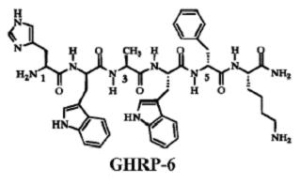Growth hormone releasing peptides (GHRPs)
Growth hormone-releasing peptides (GHRPs) are synthetic peptides endowed with a strong stimulating effect on the secretion of growth hormone in humans and animals. Growth hormone-releasing peptides act through specific called. GHRP receptors pituitary or hypothalamus (both in animals and in humans). GHRP receptor has recently been cloned and is of interest to show no sequence homology to other G-protein-coupled receptor known to date. This evidence strongly suggests that there is a natural GHRP (growth hormone releasing peptide), which has still not been found / discovered. At the same time, the mechanisms of action and the effect of growth hormone releasing peptides also still unclear. Currently suggests some data in favor of the hypothesis that growth hormone-releasing peptides could act to neutralize omatostatinergickej pituitary and hypothalamus. However, there is also the possibility of the growth hormone releasing peptides act through the hypothalamus-unknown factor (U factor), which is still open.
GHRP-6 peptidy was the first hexa-peptide extensively studied in humans. After GHRP-6 recently were synthesized growth hormone releasing additional peptides: hepta-peptide GHRP-1 and two other hexapeptides, GHRP-2 and hexarelin peptidy, which are now available for the human studies. Furthermore, developed a non-peptide mimetics of GHRP-nominal operating through GHRP receptors and their effects have been clearly demonstrated in both animals again and humans. Among the non-peptide-dicarboxylic GHRPs the MK-0677 seems to be the most interesting molecule.
GH-releasing efficacy of growth hormone-releasing peptide is a reasoned and dependent on dose / quantity of peptides received intravenous, subcutaneous, nasal or even oral administration. On long-term growth hormone releasing peptide is significantly increased production in the liver and the IGF-I (and in animals, and humans). GH-releasing effect of the growth hormone releasing peptide is independent of gender, but different with respect to age. The natural growth hormone increases from birth to puberty, then several years remains at the level reached and later in adulthood to be declining. GH-releasing activity of growth hormone releasing peptide, the synergistic activity of the natural GHRH, and not affected by the opioid receptor antagonists, such as. naloxone. The efficiency and effectiveness of the peptides on the production of growth hormone, however, may be subject to restrictions and the effects of the influence of inhibitory neurotransmitters, glucose, free fatty acid and glucocorticoids or recombinant (synthetic) HGH – human growth hormone and exogenous somatostatin (which is known, it can even close cancel the effect of GHRH).
